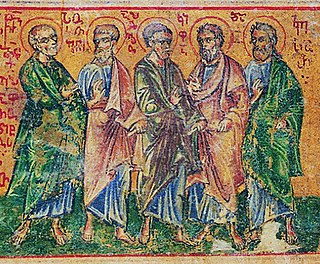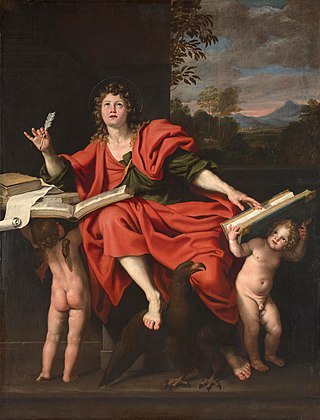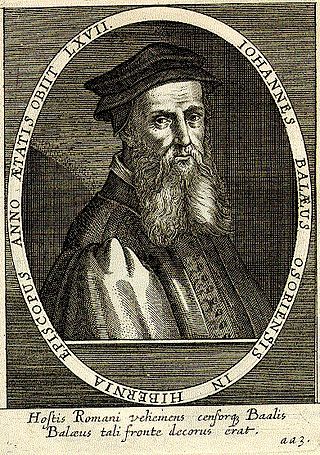Related Research Articles

Apollos was a 1st-century Alexandrian Jewish Christian mentioned several times in the New Testament. A contemporary and colleague of Paul the Apostle, he played an important role in the early development of the churches of Ephesus and Corinth.

The Book of Revelation, also erroneously called the Book of Revelations, is the final book of the New Testament. Written in Koine Greek, its title is derived from the first word of the text: apokalypsis, meaning 'unveiling' or 'revelation'. The Book of Revelation is the only apocalyptic book in the New Testament canon. It occupies a central place in Christian eschatology.

The Epistle to the Philippians is a Pauline epistle of the New Testament of the Christian Bible. The epistle is attributed to Paul the Apostle and Timothy is named with him as co-author or co-sender. The letter is addressed to the Christian church in Philippi. Paul, Timothy, Silas first visited Philippi in Greece (Macedonia) during Paul's second missionary journey from Antioch, which occurred between approximately 49 and 51 AD. In the account of his visit in the Acts of the Apostles, Paul and Silas are accused of "disturbing the city".

The First Epistle of Peter is a book of the New Testament. The author presents himself as Peter the Apostle. The ending of the letter includes a statement that implies that it was written from “Babylon”, which may be a reference to Rome. The letter is addressed to the "chosen pilgrims of the diaspora" in Asia Minor suffering religious persecution.

John Chrysostom was an important Early Church Father who served as archbishop of Constantinople. He is known for his preaching and public speaking, his denunciation of abuse of authority by both ecclesiastical and political leaders, his Divine Liturgy of Saint John Chrysostom, and his ascetic sensibilities. The epithet Χρυσόστομος means "golden-mouthed" in Greek and denotes his celebrated eloquence. Chrysostom was among the most prolific authors in the early Christian Church.
The Book ofLeviticus is the third book of the Torah and of the Old Testament, also known as the Third Book of Moses. Many hypotheses presented by scholars as to its origins agree that it developed over a long period of time, reaching its present form during the Persian Period, from 538 to 332 BC, although this is disputed.

Origen of Alexandria, also known as Origen Adamantius, was an early Christian scholar, ascetic, and theologian who was born and spent the first half of his career in Alexandria. He was a prolific writer who wrote roughly 2,000 treatises in multiple branches of theology, including textual criticism, biblical exegesis and hermeneutics, homiletics, and spirituality. He was one of the most influential and controversial figures in early Christian theology, apologetics, and asceticism. He has been described as "the greatest genius the early church ever produced".

John Bale was an English churchman, historian and controversialist, and Bishop of Ossory in Ireland. He wrote the oldest known historical verse drama in English, and developed and published a very extensive list of the works of British authors down to his own time, just as the monastic libraries were being dispersed. His contention that Joseph of Arimathea had brought a proto-Protestant faith to Britain that was purer than Catholicism was to have far-reaching ramifications; but his unhappy disposition and habit of quarrelling earned him the nickname "bilious Bale".

Joseph Barber Lightfoot, known as J. B. Lightfoot, was an English theologian and Bishop of Durham.
Christian of Stavelot was a ninth-century Christian monk. He is sometimes referred to as Christian Druthmar or Druthmar of Aquitaine. Christian was a noted grammarian, Biblical commentator, and eschatologist. He was born in Aquitaine, southwestern France, in the early ninth century AD, and became a monk at the Benedictine monastery of Corbie. At some point in the early or mid-ninth century he was sent to the abbey of Stavelot-Malmedy in Liège, to teach Bible to the monks there. It is unknown whether he died at Stavelot, returned to Corbie or was ultimately sent elsewhere.
Expositio en Brevis in Lucam is a work by the ninth-century Benedictine monk Christian of Stavelot. As its name implies, it is a commentary on the Gospel of Luke. It is, however, not nearly as comprehensive as his earlier Expositio in Matthaeum Evangelistam.
Exposito in Matthaeum Evangelistam is a work by the ninth-century Benedictine monk Christian of Stavelot. As its name implies, it is a commentary on the Gospel of Matthew. In the preface, Christian promised to produce commentaries on the other gospels, but wrote only two brief works on the Gospel of John and the Gospel of Luke, neither of which is as comprehensive or complete.

The Red Jews, a legendary Jewish nation, appear in vernacular sources in Germany during the medieval era, from the 13th to the 15th centuries. These texts portray the Red Jews as an epochal threat to Christendom, one which would invade Europe during the tribulations leading to the end of the world.
Rotrude was a Frankish princess, the second daughter of Charlemagne from his marriage to Hildegard.
John Norman Davidson Kelly was a British theologian and academic at the University of Oxford and Principal of St Edmund Hall, Oxford, between 1951 and 1979, during which the hall transformed into an independent constituent college of the university and later a co-educational establishment.

Salem Web Network is a Christian website company, headquartered in Richmond, Virginia with offices in Dallas and Nashville. The company is owned and operated by Salem Communications.
Trifolius was a Christian theologian of the sixth century. He is known for his Epistula ad beatum Faustum senatorem contra Ioannem Scytham monachum of 519/20, written to the Roman senator Faustus. It is a report on the beliefs of the Scythian monks, putting those in the context of other views condemned as heretical by the Catholic Church. It played a part in the rejection of the Theopaschite doctrine.
Stefano degli Angeli was an Italian mathematician, philosopher, and Jesuate.

The Jamieson-Fausset-Brown Bible Commentary refers to a biblical commentary entitled a Commentary Critical and Explanatory on the Whole Bible, prepared by Robert Jamieson, Andrew Robert Fausset and David Brown and published in 1871; and derived works from this initial publication, in differing numbers of volumes and abridgements.
References
- Schaff, Philip. History of the Christian Church. Volume IV: Mediaeval Christianity. A.D. 590–1073. Grand Rapids, MI, 1882. Page 172. Online as Christian Druthmar at CCEL